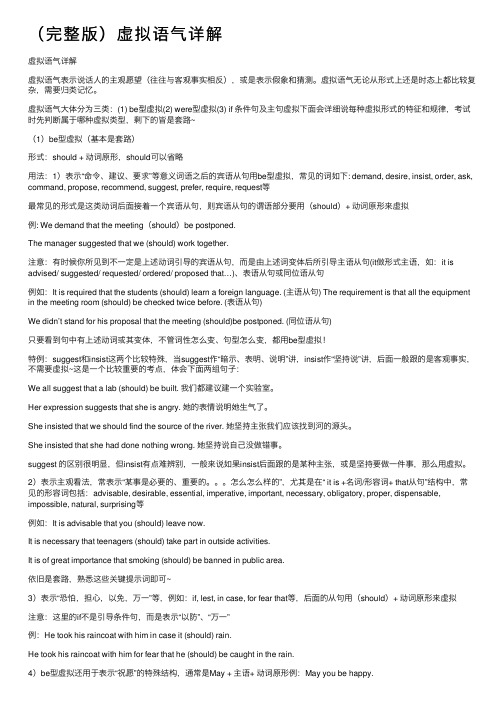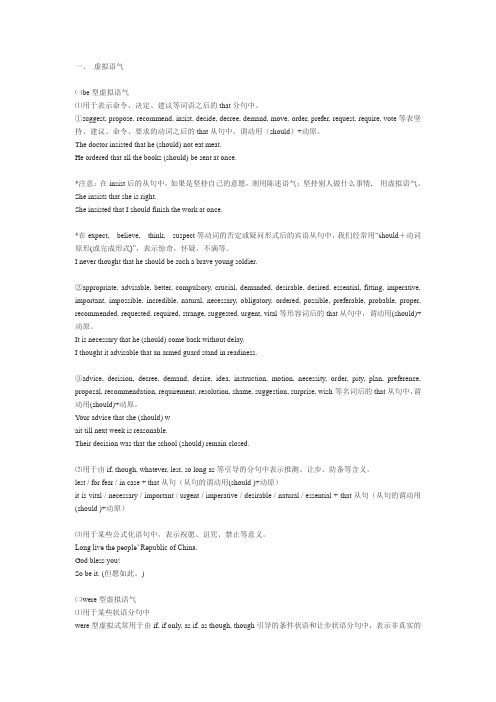be型虚拟语气及倒装
虚拟语气的be动词用法

虚拟语气的be动词用法
虚拟语气是指在表达一种假设、愿望、建议、命令等非现实情况时使用的一种语气,用来表达一种虚构的、与事实相反或不确定的情况。
在英语中,be动词在虚拟语气中的用法有以下几种:
1. 虚拟条件句中的be动词用法:
- If I were you, I would go.(如果我是你,我会去。
)
- If she were here, she would help us.(如果她在这里,她会帮助我们。
)
2. 虚拟愿望句中的be动词用法:
- I wish I were taller.(我希望我更高。
)
- She wishes she were a famous singer.(她希望自己是一位著名的歌手。
)
3. 虚拟建议句中的be动词用法:
- I suggest that he be more careful.(我建议他要更加小心。
)
- It is important that she be on time.(她准时到达很重要。
)
4. 虚拟命令句中的be动词用法:
- It is demanded that the documents be submitted immediately.(要求立即提交文件。
)
- The teacher insisted that the students be quiet.(老师坚持要求学生保持安静。
)
需要注意的是,虚拟语气的be动词在所有人称和时态中都是用were,而不是was。
这是一种固定的用法,并不依赖于主语的人称和时态。
高中必备知识点解析虚拟语气的形式与用法

高中必备知识点解析虚拟语气的形式与用法虚拟语气是高中英语必备的语法知识点之一。
它在英语中经常被用于表达假设、愿望、建议、命令和推测等情态,通过使用虚拟语气,可以使语言更加丰富和准确。
本文将深入解析虚拟语气的形式与用法。
一、虚拟语气的形式1. 虚拟语气的一般现在时:用于表示与现在事实相反的情况。
其结构为:主语+动词原形(倒装)。
例如:If I were you, I would study harder.(如果我是你,我会更加努力学习。
)2. 虚拟语气的一般过去时:用于表示与过去事实相反的情况。
其结构为:主语+动词过去式(倒装)。
例如:If I had seen her yesterday, I would have said hello.(如果我昨天见到她,我会问好的。
)3. 虚拟语气的过去完成时:用于表示对过去情况的猜测或不可能发生的情况。
其结构为:主语+动词过去完成式(倒装)。
例如:I wish I had studied harder for the exam.(我希望我为考试努力学习。
)二、虚拟语气的用法1. 表达假设与条件:If I were you, I would travel around the world.(如果我是你,我会环游世界。
)I wish I had a million dollars.(我希望我有一百万美元。
)2. 表达愿望与建议:I wish you would stop smoking.(我希望你戒烟。
)It's important that she arrive on time.(她按时到达很重要。
)3. 表达命令与要求:The teacher ordered that the students be quiet.(老师要求学生们保持安静。
)She insisted that he leave immediately.(她坚持要他立刻离开。
)4. 表达推测与猜测:He looks as if he were sick.(他看起来像是生病了。
be型虚拟语气及倒装

be-型虚拟式的主要用法如下。
用于表示命令、决定、建议等词语之后的that-分句中be-型虚拟式的这一用法又有以下三种情况:a)用在decide, decree, demand,insist,moveorder,prefer,propose,recommend,request,require,suggest,vote等动词之后的that分句中。
例如:He ordered that all the books be sent at once.We propose that somebody neutral take the chair(担任主席)。
She insisted that she go to the south for her holiday.Congress has decided /voted/ decreed that the present law be maintained.The doctor insisted that he not eat meat.b)用在decision, decree, demand, Instruction, order, requirement, resolution等名词之后的that-分句中。
例如:The board(理事会) has given instructions that the agent fly to Boston.We were faced with the demand that this tax be abolished.Your advice that she wait till next week is reasonable.Their decision was that the school remain closed.His order that the troops not be sent at once was carried out.在这一用法中be-型虚拟式能与“should +不定式”交替使用,也能与不定式被动语态交替使用。
(完整版)虚拟语气详解

(完整版)虚拟语⽓详解虚拟语⽓详解虚拟语⽓表⽰说话⼈的主观愿望(往往与客观事实相反),或是表⽰假象和猜测。
虚拟语⽓⽆论从形式上还是时态上都⽐较复杂,需要归类记忆。
虚拟语⽓⼤体分为三类:(1) be型虚拟(2) were型虚拟(3) if 条件句及主句虚拟下⾯会详细说每种虚拟形式的特征和规律,考试时先判断属于哪种虚拟类型,剩下的皆是套路~(1)be型虚拟(基本是套路)形式:should + 动词原形,should可以省略⽤法:1)表⽰“命令、建议、要求”等意义词语之后的宾语从句⽤be型虚拟,常见的词如下: demand, desire, insist, order, ask, command, propose, recommend, suggest, prefer, require, request等最常见的形式是这类动词后⾯接着⼀个宾语从句,则宾语从句的谓语部分要⽤(should)+ 动词原形来虚拟例: We demand that the meeting(should)be postponed.The manager suggested that we (should) work together.注意:有时候你所见到不⼀定是上述动词引导的宾语从句,⽽是由上述词变体后所引导主语从句(it做形式主语,如:it is advised/ suggested/ requested/ ordered/ proposed that…)、表语从句或同位语从句例如:It is required that the students (should) learn a foreign language. (主语从句) The requirement is that all the equipment in the meeting room (should) be checked twice before. (表语从句)We didn’t stand for his proposal that the meeting (should)be postponed. (同位语从句)只要看到句中有上述动词或其变体,不管词性怎么变、句型怎么变,都⽤be型虚拟!特例:suggest和insist这两个⽐较特殊,当suggest作“暗⽰、表明、说明”讲,insist作“坚持说”讲,后⾯⼀般跟的是客观事实,不需要虚拟~这是⼀个⽐较重要的考点,体会下⾯两组句⼦:We all suggest that a lab (should) be built. 我们都建议建⼀个实验室。
虚拟语气总结材料be型和were型

目录:学习虚拟语气的三个必知一、were式虚拟二、be式虚拟三、几个特殊的句式学习虚拟语气必须明确了解以下三点:1、英语的所谓“虚拟语气”,从用途上区别有三种:一种用来表达与实际情况相反的虚构假设,一种用来表达“祈使愿望”的口气,另一种满足特殊的句式需要。
虚拟语气并不全是在表达虚构的情况,理解这一点非常重要。
2、虚拟语气从句式表现上有三种:表达与实际情况相反的虚构假设用were式虚拟,表达“祈使愿望”的口气be式虚拟,在特殊句式中的照句式要求而定。
3、学习虚拟语气,其目的不在于单纯解决语法问题,更不能停留在应试的层面上。
掌握虚拟语气的用法对英语的阅读理解非常重要,尤其是进入大学以后,这一点更为重要。
一、were式虚拟英语中,被叫做“were式虚拟”的这种虚拟语气,通过扭曲时态形式来表示与实际情况相反的虚构假设,具体的做法是将时态的形式“倒推一个时态”。
这样的表述也许不太准确,但是非常实用,也极容易理解。
具体的做法,就是将现在时态变成过去时态,将过去时态变成“过去的过去”。
在这种虚拟语气的用法中,动词be至少要倒退一个时态成为“过去时态”的were(在虚拟语气中一般不用was,is、am、are倒推一个时态以后都写成were)。
因此,这种表示与实际情况相反的虚构假设的虚拟语气就就以动词be的变化为例,叫做了were式虚拟。
were式虚拟主要用在wish从句,as if从句和非真实条件句。
下面我们结合具体的例子学习were式虚拟的用法:wish从句的虚拟语气用法:英语中表达一般性的愿望(即希望)用hope这个词,wish 这个词往往表达难以实现或不能实现的愿望,所以要用虚拟语气,我们可以看看具体的用法:I wish I had the money to buy the book.这句话表达的意思是,“我现在没有钱买这本书,但是希望能买这本书,而因为没有钱,虽然有这种愿望,却也买不了这本书。
”wish从句中的动词have用来表达“现在有与没有”的情况,通过一个把have“倒推一个时态”变成had,had实际上表达了一个“现在没有”的概念,正好与have这个词的本义相反。
2019-2020年高考英语虚拟语气和倒装句型

2019-2020年高考英语虚拟语气和倒装句型虚拟语气是通过特殊的谓语动词形式来表达的愿望、假设、怀疑、猜测或建议等语气,它不表示客观存在。
一、虚拟语气在单句中的用法常用来表示祝愿、采用固定的倒装句式。
例如:Long live the People s Republic of China!中华人民共和国万岁!be happy! 快乐!have a good time! 玩得愉快! succeed! 成功!make progress! 进步!二、虚拟语气在复合句中的用法:1.在非真实性条件句与主句中的用法 1) 表示与现在事实相反条件从句 主句一般过去时(be 多用于were ) would/should/could/might +动词原形例如:If I were you,I should accept the invitation.如果我是你,我会接受邀请的。
如果我有空,我就去那儿。
2) 与过去事实相反May 祝条件从句主句过去完成时would/should/could/might+havedone例如:If you had e earlier,you couldn t/wouldn t have missed the bus.如果你早点来,你就不会错过那辆公共汽车了。
If he had seen you yesterday,he would have returned your book.如果他昨天见到了你,他就会还你的书的。
3)与将来事实可能相反条件从句主句一般过去时(be多用were)should do,were to do would/should/could/might+动词原形例如:If it should rain/were to rain/rained tomorrow,the sports meet would beput off.万一明天下雨,运动会就推迟。
(事实上明天下雨的可能性不大。
虚拟语气与倒装句型

虚拟语气、倒装句型虚拟语气虚拟语气是通过特殊的谓语动词形式来表达的愿望、假设、怀疑、猜测或建议等语气,它不表示客观存在。
一、虚拟语气在单句中的用法常用来表示祝愿、采用固定的倒装句式。
例如:Long live the People ⨯s Republic of China!中华人民共和国万岁!be happy! 快乐!have a good time! 玩得愉快! succeed! 成功!make progress! 进步!二、虚拟语气在复合句中的用法:1. 在非真实性条件句与主句中的用法1) 表示与现在事实相反如果我是你,我会接受邀请的。
If I had time,I would go there.如果我有空,我就去那儿。
2) 与过去事实相反例如:If you had come earlier,you couldn ⨯t/wouldn ⨯t have missed the bus.如果你早点来,你就不会错过那辆公共汽车了。
If he had seen you yesterday,he would have returned your book.如果他昨天见到了你,他就会还你的书的。
3) 与将来事实可能相反例如:If it should rain/were to rain/rained tomorrow,the sports meet would be put off.万一明天下雨,运动会就推迟。
(事实上明天下雨的可能性不大。
)If you dropped/should drop/were to drop the glass,it would break.万一杯子掉下来会打碎的。
4) i f 的省略如果条件句中有were,had,should 等助动词,可将if 省略,而把were,had 或should置于句首,来表达以if 引导的条件句的相同意思。
例如:Should it rain/were it to rain tomorrow,the sports meet would be put off./Had he seen May you 祝你you yesterday,he would have returned your book.5)条件句或主句的省略当有上下文或上下句中的语言环境暗示的时候,表示虚拟语气的从句或主句往往可以省略,以避免重复。
虚拟语气

一、虚拟语气㈠be型虚拟语气⑪用于表示命令、决定、建议等词语之后的that分句中。
①suggest, propose, recommend, insist, decide, decree, demand, move, order, prefer, request, require, vote等表坚持、建议、命令、要求的动词之后的that从句中,谓动用(should)+动原。
The doctor insisted that he (should) not eat meat.He ordered that all the books (should) be sent at once.*注意:在insist后的从句中,如果是坚持自己的意愿,则用陈述语气;坚持别人做什么事情,用虚拟语气。
She insists that she is right.She insisted that I should finish the work at once.*在expect,believe,think,suspect等动词的否定或疑问形式后的宾语从句中,我们经常用“should+动词原形(或完成形式)”,表示惊奇,怀疑,不满等。
I never thought that he should be such a brave young soldier.②appropriate, advisable, better, compulsory, crucial, demanded, desirable, desired, essential, fitting, imperative, important, impossible, incredible, natural, necessary, obligatory, ordered, possible, preferable, probable, proper, recommended, requested, required, strange, suggested, urgent, vital等形容词后的that从句中,谓动用(should)+动原。
- 1、下载文档前请自行甄别文档内容的完整性,平台不提供额外的编辑、内容补充、找答案等附加服务。
- 2、"仅部分预览"的文档,不可在线预览部分如存在完整性等问题,可反馈申请退款(可完整预览的文档不适用该条件!)。
- 3、如文档侵犯您的权益,请联系客服反馈,我们会尽快为您处理(人工客服工作时间:9:00-18:30)。
be-型虚拟式的主要用法如下。
用于表示命令、决定、建议等词语之后的that-分句中be-型虚拟式的这一用法又有以下三种情况:a)用在decide, decree, demand,insist,moveorder,prefer,propose,recommend,request,require,suggest,vote等动词之后的that分句中。
例如:He ordered that all the books be sent at once、We propose that somebody neutral take the chair(担任主席)。
She insisted that she go to the south for her holiday、Congress has decided /voted/ decreed that the present law be maintained、The doctor insisted that he not eat meat、b)用在decision, decree, demand, Instruction, order, requirement, resolution等名词之后的that-分句中。
例如:The board(理事会) has given instructions that the agent fly to Boston、We were faced with the demand that this tax be abolished、Your advice that she wait till next week is reasonable、Their decision was that the school remain closed、His order that the troops not be sent at once was carried out、在这一用法中be-型虚拟式能与“should +不定式”交替使用,也能与不定式被动语态交替使用。
例如:He ordered that the books be sent at once、=He ordered that books should be sent at once、=He ordered the books to be sent at once、It is important that she be placed in an appropriate job、=It is important that she should be placed in an appropriate job、=It is important for her to be placed in an appropriate job、be-型虚拟式能用于由if, though, whatever, lest, so long as等引导的分句中表示推测、让步、防备等含义。
例如:If he be found guilty, John shall have the tight of appeal、If the rumour be true, everything is possible、Though everyone desert you, I will notWhatever be his defense, we cannot tolerate this disloyalty、So long as a volume hold together, I am not disturbed as to its outer appearance、Whether she be right or wrong, she will have my unswerving support、Quietly we sat on the river bank lest the fish swim away、上述用法现在只限于正式书面语体,在非正式语体中通常用动词陈述式或者用should/may+不定式。
例如:If the rumour is true, everything is possible、He hid himself in the bush lest he should be seen、Whatever his defense may be, we can\'t tolerate this disloyalty、用于某些公式化的语句中be-型虚拟式用于某些公式化语句中可表示祝愿、诅咒、禁止等意义。
例如:Long live the People\'s Republic of China!God bless you!Heaven forbid!(天理不容)Devil take him!(混蛋)So be it、(但愿如此/就这样吧。
)Suffice it to say that、、、(只需说……就够了。
)Far be it from me to(我极不愿) spoil the fun、He will remain here if need be、Home is home,be it ever so homely、语法----倒装英语句子的语序通常就是主语在前,谓语在后,这种语序称作正常语序或自然语序。
但有时出于语法或达到某种修辞目的(强调、承上启下、平衡等)的需要,要把谓语动词放在主语前面,这种语序称作倒装(Inversion)语序。
将谓语动词完全移至主语之前,称完全倒装(Full Inversion);如果只就是把助动词或情态动词放在主语之前,称为部分倒装。
1、 there be结构的倒装在“there be”(或there + appear to be,come,exist, happen to be, lie, live, occur, remain, seem, seem to be, stand, used to be) 雪结构中,倒装形式为完全倒装。
如:There were many students in the reading room in this evening、今晚阅览室里有许多学生。
There is a TV set, a stereo system and a number of chairs in the sitting room、客厅里有一台电视机,一套组合音响与一些椅子。
2、 here,there,now,then等引起的倒装在以here,there,now,then等简短副词引起的句子中(前三个须用一般现在时),动词往往就是be,come,go等时, 这类句子大多带有引起注意的含义。
如:Here comes the bus、公共汽车来了。
Here is the letter you have been looking forward to、您久盼的信在这儿。
但要注意:如果主语就是人称代词,则不用倒装。
如:Here they are、她们在这儿。
3、省略if的非真实条件状语从句中的倒装虚拟结构中的条件从句省去if时,were, had, should须移至主语之前。
如:Had you worked harder at college, you would have got better job、如果您在大学期间读书用功些,现在就会找到一份更好的工作。
Were he better qualified, he would apply for the position、要就是她的条件再好些,她就申请这个职位。
4、副词so, neither, nor等引起的倒装在用so, nor, neither表示“也/不……”这一类结构里其公式就是:肯定: so+be/have/助动词/情态动词+主语否定: Neither(nor)+be/have/助动词/情态动词+主语。
如:—He has been to Beijing、她去过北京。
—So have I、我也去过。
—They can’t answer the question、她们不会回答这个问题。
—Neither than I、我也不会。
5、 what,how引起的倒装以What, how开头的感叹句(表语或宾语提前)。
如:What beautiful weather (it is)!多好的天气啊!(表语提前)What a lovely picture he painted!她画了一张多好的画啊!(宾语提前)6、疑问词或连接词引起的倒装在疑问词或连接词whether等引起的从句中。
如:Whatever you may say, I won’t go there、无论您怎样说,我都不会去那儿。
(状语从句中宾语提前)What book he wants is not clear、她要什么书还不清楚。
(主语从句中宾语提前)7、否定词位于句首时引起的倒装(1)、never,seldom,hardly,little,few等引起的倒装否定词never,seldom,rarely,hardly,barely,scarcely,little,few等位于句首时所引起的倒装句通常为部分倒装形式,如果谓语动词为be的一般现在时或一般过去时,则为完全倒装形式。
如:Never shall I forget the days when you were with us、我很少有时间去瞧电影。
(2)、nowhere,no longer,no more等引起的倒装nowhere(无处),no longer(不再),no more(也不)等否定词位于句首时所引起的倒装句通常为部分倒装形式,如果谓语动词为be的一般现在时或一般过去时,则为完全倒装形式:No longer was he in charge of this work、她不再负责这项工作了。
(3)、not until,not a,not in the least等引起的倒装not until(直到……才),not a(一个……也没有),not in the least(一点儿也不),not for a minute/moment(一点儿也不)等位于句首时,通常引起倒装(not a之后的名词作主语时除外),其形式通常为部分倒装形式,如果谓语动词为be的一般现在时或一般过去时,则为完全倒装形式。
如:Not until all the demands had been turned down did the workers decide to go on strike、一直到所有的要求遭到拒绝之后,工人们才决定罢工。
